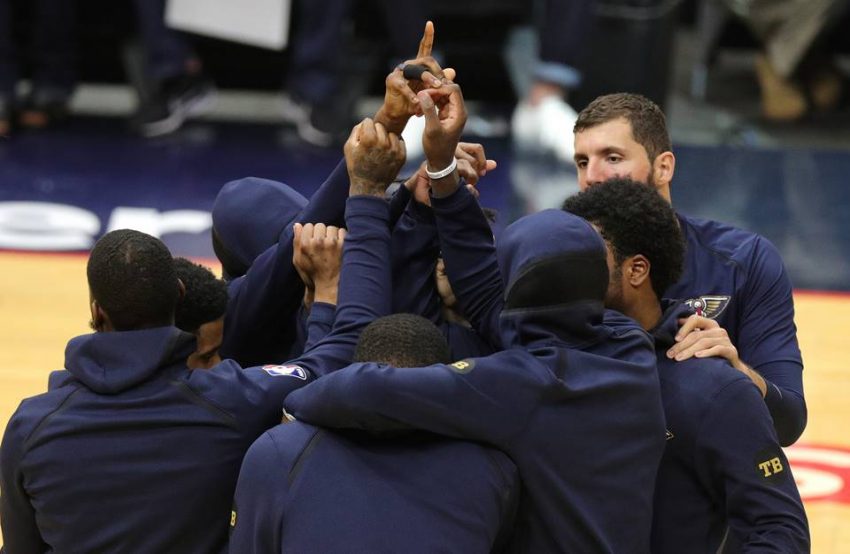Pelicans must sustain success in close games but play fewer of them

One of the key elements in the New Orleans Pelicans’ success last season was their ability to win close games.
The Pelicans embraced the New Orleans sports tradition previously mastered by the Saints, by putting fans into potential cardiac arrest on a fairly regular basis.
In all, 50 contests, more than half the schedule, were decided in so-called “clutch” situations (games within five points in the final five minutes of regulation and/or overtime), winning 30.
The 50 games played tied the Pels for second in the NBA in that category, with their 30 clutch victories topping the league. New Orleans was one of only five teams in the league to win at least 60 percent of the time in those situations (Houston, Cleveland, Golden State, and Toronto).
Those wins represented half of all the team’s total for the season. Since the Pelicans were only two games from missing the playoffs, they needed just about every one of them. Though they won 48 regular season contests, New Orleans played like a 44-win team according to Basketball Reference.
One reason the Pelicans went down to wire so often is that they ranked 13th in the league in point differential, outscoring opponents by 1.3 points per game. Only four playoff teams were ranked lower, and all four (Cleveland, Washington, Miami, and Milwaukee) play in the Eastern Conference.
That’s a shocking statistic when you consider that New Orleans was one of the NBA’s best defensive teams over the second half of the season and possessed the offensive firepower to score 112 points each night.
One can’t help but think that those numbers have been swirling in the back of General Manager Dell Demps’ mind since the close of the season and throughout this summer.
The fact of the matter is, great teams win close games but don’t play a lot of them.
Over the past decade, only one NBA champion played in as many clutch games as the Pelicans did last season; the 2010-11 Dallas Mavericks, also with 50. In fact, only three champions have even topped 40 games; none since the Miami Heat won their second straight title in 2013.
Since then, the average clutch games played by an NBA Champion per season has been 29.6, compared to 34.1 for the decade as a whole. The Golden State Warriors have averaged 29.3 clutch games over the last three seasons.
Southwest Division rival Houston cut its clutch game count from 49 in 2015-16 to 35 last season. Even with Kawhi Leonard sidelined for 73 games, the San Antonio Spurs still managed to find themselves in clutch situations only 37 times, right in line with their average of 36.6 since 2015-16.
Cutting the number of close games by 10 or so could be the difference between homecourt advantage in the first round and missing the playoffs entirely. Last season, the Pelicans danced on the edge of a razor and didn’t get cut, but they can’t put themselves in that position again.
There are encouraging signs in the numbers that say they won’t.
The Pels played 33 of those 50 nailbiters prior to DeMarcus Cousins’ injury, or two-thirds of their season total and nearly 70 percent of the 48 games they had played up to that point. New Orleans went 19-14 in those contests (10-7 at home, 9-7 on the road).
With Cousins out of the lineup, the Pelicans only played 17 clutch games in their final 34, tying them for 12th most in the league in that span. Thier 11 wins were good for sixth-best in the NBA. The defensive surge that helped carry the Pels down the stretch, carried over to New Orleans’ performance in tight games. The Pels posted a defensive rating of 89.0, trailing only the Rockets.
Their net rating of 20.7 during the final five minutes was more than 3.5 times better than it was prior to the loss of Cousins. And, if the Pelicans had played as well as they did in close games over the season’s final 34 games for the entire season, they would have finished with 41 clutch games and a record of 27-14 in those games.
That means the Pelicans could have gone 21-20 in their remaining 41 games and still matched their 48 wins.
| CLUTCH STATS | GP | W | L | Pct. | ORTG | DRTG | NETRTG | PACE |
| Pre-injury | 33 | 19 | 14 | .575 | 113.6 | 107.7 | 5.9 | 95.50 |
| Post-injury | 17 | 11 | 6 | .647 | 109.6 | 89.0 | 20.7 | 101.72 |
Of course Cousins and Rajon Rondo have both moved on, while Julius Randle and Elfrid Payton have moved in.
| PLAYER | G | MP | FG% | 3P% | FT% | REB | AST | TO | STL | BLK | +/- |
| D. Cousins | 28 | 4.6 | 44.1 | 31.8 | 75.0 | 1.5 | 0.7 | 0.5 | 0.1 | 0.3 | 0.6 |
| J. Randle | 35 | 4.0 | 54.5 | 50.0 | 64.3 | 1.0 | 0.3 | 0.3 | 0.1 | 0.2 | -0.8 |
| R. Rondo | 22 | 3.4 | 63.6 | 75.0 | 57.1 | 0.3 | 0.5 | 0.1 | 0.1 | 0.1 | 0.8 |
| E. Payton | 17 | 3.5 | 53.3 | 50.0 | 80.0 | 0.2 | 0.3 | 0.2 | 0.1 | 0.1 | -3.5 |
The two youngsters posted very comparable numbers to their predecessors in clutch games. Considering the losing situations from which both came before signing in New Orleans, it wouldn’t be a stretch to think that their performance would improve at least slightly.
And if that happens, the Pelicans will find themselves moving farther down their path to joining the NBA elite.
My heart would certainly appreciate it.
- < PREV Tough tests await Tulane women's hoops in 2018-19 non-conference schedule
- NEXT > Pelicans to sign free agent forward Troy Williams
David Grubb
Sports 1280am host/CCS reporter
David Grubb has more than a decade of experience in the sports industry. He began his career with KLAX-TV in Alexandria, La. and followed that up with a stint as an reporter and anchor with WGGB-TV in Springfield, Mass. After spending a few years away from the industry, David worked as sports information director for Southern University at New Orleans…





